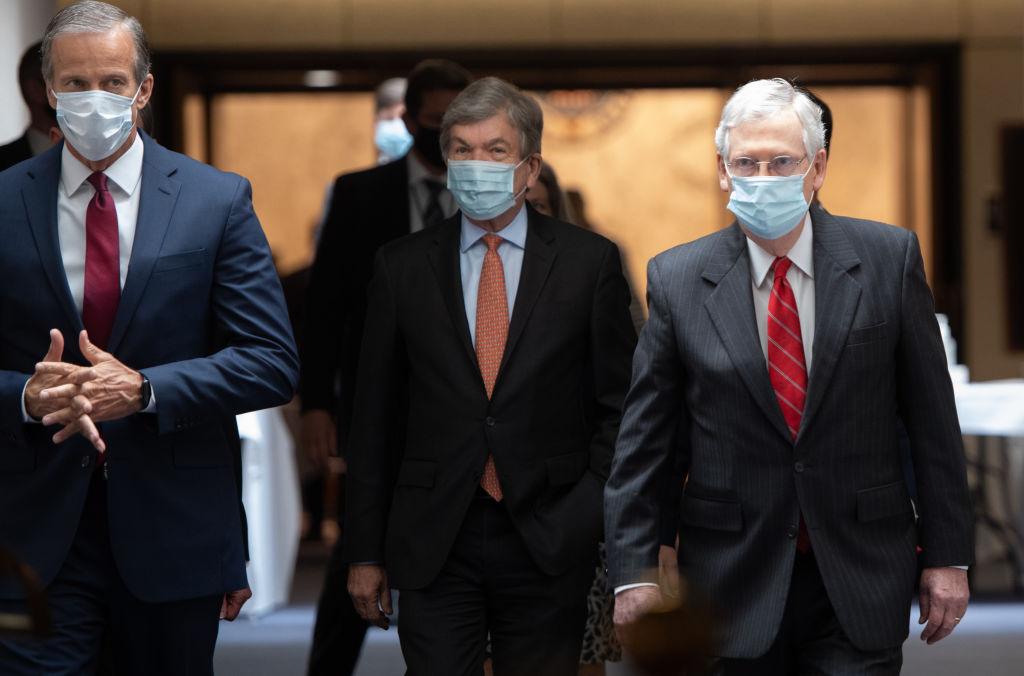Ordering, asking, or shaming: What's the best way to get Americans to wear face masks?


A free daily email with the biggest news stories of the day – and the best features from TheWeek.com
You are now subscribed
Your newsletter sign-up was successful
"In Republican circles — with the notable exception of the man who leads the party — the debate about masks is over: It's time to put one on," The Associated Press reports. GOP House and Senate leaders, governors, and rank-and-file lawmakers have joined Democrats and public health officials in urging Americans to mask up when they go out in public, as COVID-19 ravages the South and Southwest.
At Fox News, hosts Steve Doocy and Sean Hannity have publicly pleaded with President Trump to at least occasionally wear a mask. You might have seen videos of other refuseniks. Research shows masks are effective at containing the coronavirus, so what's the best way to get holdouts to put on their masks?
1. Persuasion: Seeing other people wear masks, including Trump but more importantly members of your social network, is probably the best way to convince mask skeptics, Ray Niaura, a social and behavioral scientist at NYU, tells Politico. "Eventually people are going to say, 'Well all my friends and acquaintances are doing it and they don't seem to be too bent out of shape, so maybe I'll try it', as opposed to 'The government's coming to take my guns and they're forcing me to wear a mask.'"
The Week
Escape your echo chamber. Get the facts behind the news, plus analysis from multiple perspectives.

Sign up for The Week's Free Newsletters
From our morning news briefing to a weekly Good News Newsletter, get the best of The Week delivered directly to your inbox.
From our morning news briefing to a weekly Good News Newsletter, get the best of The Week delivered directly to your inbox.
2. Mandate: Persuasion didn't work with seat belts, despite a big, expensive federal ad campaign in the 1980s, University of Oregon psychology professor Paul Slovic tells Politico. But once wearing seat belts was mandated by law, compliance went from 10 percent "up to that 70, 75 percent," he said. "It wouldn't have gotten there voluntarily, so I think the message for mask wearing is to mandate it and to enforce it." Goldman Sachs forecast Monday that a national mask mandate would boost compliance by 15 percentage points and "potentially substitute for lockdowns that would otherwise subtract nearly 5 percent from GDP."
3. Public pressure: "Social pressure or social disapproval is far more effective in getting people to wear masks," countered Steven Taylor, a clinical psychologist at the University of British Columbia, pointing to the Anti-Mask League that formed in San Francisco during the 1918 flu epidemic.
Lawrence Gostin, a public health expert at Georgetown, said attempts to encourage mask wearing "might be too late" at this point. "The public has received such mixed messages from the administration," he told AP. "I fear we may be stuck with coronavirus until it burns through the American population and leaves hundreds of thousands dead."
A free daily email with the biggest news stories of the day – and the best features from TheWeek.com
Peter has worked as a news and culture writer and editor at The Week since the site's launch in 2008. He covers politics, world affairs, religion and cultural currents. His journalism career began as a copy editor at a financial newswire and has included editorial positions at The New York Times Magazine, Facts on File, and Oregon State University.
-
 The ‘ravenous’ demand for Cornish minerals
The ‘ravenous’ demand for Cornish mineralsUnder the Radar Growing need for critical minerals to power tech has intensified ‘appetite’ for lithium, which could be a ‘huge boon’ for local economy
-
 Why are election experts taking Trump’s midterm threats seriously?
Why are election experts taking Trump’s midterm threats seriously?IN THE SPOTLIGHT As the president muses about polling place deployments and a centralized electoral system aimed at one-party control, lawmakers are taking this administration at its word
-
 ‘Restaurateurs have become millionaires’
‘Restaurateurs have become millionaires’Instant Opinion Opinion, comment and editorials of the day
-
 Nobody seems surprised Wagner's Prigozhin died under suspicious circumstances
Nobody seems surprised Wagner's Prigozhin died under suspicious circumstancesSpeed Read
-
 Western mountain climbers allegedly left Pakistani porter to die on K2
Western mountain climbers allegedly left Pakistani porter to die on K2Speed Read
-
 'Circular saw blades' divide controversial Rio Grande buoys installed by Texas governor
'Circular saw blades' divide controversial Rio Grande buoys installed by Texas governorSpeed Read
-
 Los Angeles city workers stage 1-day walkout over labor conditions
Los Angeles city workers stage 1-day walkout over labor conditionsSpeed Read
-
 Mega Millions jackpot climbs to an estimated $1.55 billion
Mega Millions jackpot climbs to an estimated $1.55 billionSpeed Read
-
 Bangladesh dealing with worst dengue fever outbreak on record
Bangladesh dealing with worst dengue fever outbreak on recordSpeed Read
-
 Glacial outburst flooding in Juneau destroys homes
Glacial outburst flooding in Juneau destroys homesSpeed Read
-
 Scotland seeking 'monster hunters' to search for fabled Loch Ness creature
Scotland seeking 'monster hunters' to search for fabled Loch Ness creatureSpeed Read
